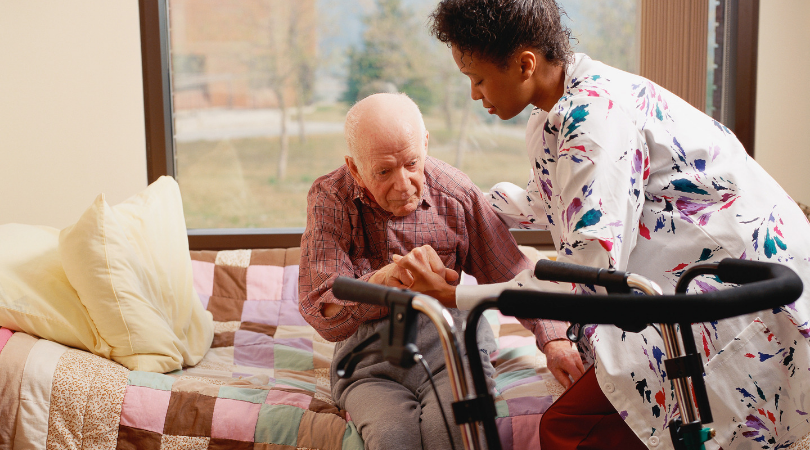Is Hospice Only for the Dying?

“Is hospice only for the dying?”
Most people would answer yes to this question. In fact, many patients are admitted to hospice care with only a few hours or days left.
These patients are actively dying – and their families are often surprised to learn that their loved one was eligible for all of the care and support that the Medicare hospice benefit provides much earlier.
Patients are eligible to receive hospice services if they meet hospice criteria and have been diagnosed with six months or less to live if their disease runs the typical course. That is six months of pain management. Six months without late-night runs to the emergency room. Six months of having symptoms managed in the patient’s place of residence.
This type of support can be a godsend to patients and their families.

Who is eligible for hospice?
In order to be eligible for hospice, a patient must be diagnosed with a terminal illness. This occurs when treatment is no longer effective or when a patient has decided they want to focus on quality of life over aggressive treatment plans.
Some of the things a physician will look for when making this determination are:
- A pattern of frequent hospitalizations in the past six months
- Increasing weakness, fatigue, and weight loss
- Recurring infections or skin breakdown
- Changes in cognitive and functional abilities
- Decline in the patient’s activities of daily living including eating, dressing, bathing, toileting, continence, transferring or walking
- Disease-specific decline
See disease-specific hospice eligibility criteria.
If a patient is not yet eligible for hospice care or if they are still pursuing curative treatment, they may qualify for palliative care. Palliative care partners with the patient’s physician to provide increased monitoring of the patient with home visits from a nurse practitioner and social worker.

Hospice isn’t just for the final days — it’s for the final months.
Contrary to common misconception, hospice care is not limited to the actively dying. It is a compassionate, holistic form of care available to individuals diagnosed with a life-limiting illness and a prognosis of six months or less to live, as certified by a physician. But this does not mean a person must be bedridden or in their final days to qualify.
In fact, starting hospice care earlier can make a significant difference in a patient’s quality of life.
At Crossroads Hospice & Palliative Care, we believe in meeting patients where they are in their journey—whether they’ve just received a terminal diagnosis or are nearing the end of life. Hospice care from Crossroads focuses on comfort, dignity, and emotional well-being, and is delivered in the setting that best supports the patient: at home, the hospital, or in a long-term care community.
Early hospice enrollment means better quality of life.
Research supports what our care teams see every day: patients who enroll in hospice earlier experience better symptom control, improved emotional health, and greater satisfaction with care. A study published in The New England Journal of Medicine found that patients with advanced cancer who received early palliative care lived longer and experienced less depression than those receiving standard care alone [1].
Another study in Journal of Pain and Symptom Management concluded that families of patients who received hospice care for more than 30 days were more likely to rate the care as “excellent” compared to those who enrolled later [2].
What is the benefit of early access to hospice care?
An earlier admission to hospice care gives patients and their families the opportunity to receive the full benefit of hospice care. As soon as they are admitted to hospice care, the patient will begin to receive visits in their place of residence from a full team of hospice care professionals including a nurse, hospice aide, social worker, chaplain, and volunteers.
The support of this team helps prevent the need for hospitalizations and supplements the care family or facility staff are providing for the patient, preventing burnout and improving the patient and family’s quality of life.
This improved quality of life that a patient receives while on hospice care allows them to spend more time with the people they love and gives both the patient and their family the opportunity to express all of the things they need to say while they have this time together.
To learn more about the programs and services Crossroads Hospice & Palliative Care offers to terminally ill patients, please call 1-888-564-3405.
Hospice is for more than cancer.
While many associate hospice with terminal cancer, hospice is appropriate for a wide range of serious illnesses. Crossroads supports patients with dementia, heart failure, COPD, ALS, liver and kidney disease, HIV/AIDS, and stroke, among others. These individuals often suffer from multiple symptoms—shortness of breath, pain, confusion, fatigue—and benefit from coordinated, whole-person care.
Hospice addresses not only physical discomfort, but also emotional, social, and spiritual concerns. At Crossroads, we also offer bereavement support, caregiver respite, and assistance with advance directives, providing peace of mind for both patients and families.
Don’t wait.
If your loved one has a life-limiting condition—even if they are still mobile or undergoing treatments to manage symptoms—it may be time to consider hospice. Early referrals allow patients to fully benefit from the wide range of support services hospice provides. Our admissions team is available 24/7 to answer questions and help determine eligibility.
Learn more about what makes Crossroads different.
Sources:
[1] Temel JS, Greer JA, Muzikansky A, et al. "Early Palliative Care for Patients with Metastatic Non–Small-Cell Lung Cancer." New England Journal of Medicine. 2010;363(8):733-742.
[2] Teno JM, Casarett D, Spence C, Connor S. "It is ‘too late’ or is it? Bereaved family member perceptions of hospice referral when their family member was on hospice for seven days or less." Journal of Pain and Symptom Management. 2012;43(4):732-738.
If you found this information helpful, please share it with your network and community.
Copyright © 2025 Crossroads Hospice & Palliative Care. All rights reserved.




